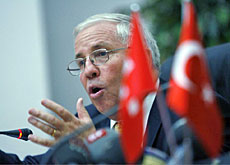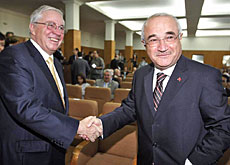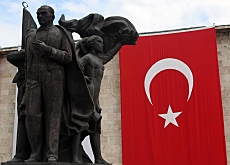Expert questions Blocher anti-racism remarks

Justice Minister Christoph Blocher should have defended and not criticised the Swiss anti-racism law during a trip to Turkey, according to a leading law expert.
Marcel Niggli, professor of law of Fribourg University, told swissinfo that it was strange that Blocher should have made the comments during an official visit abroad.
Blocher unleashed a storm of political and media protest at home after he remarked on Wednesday that part of the law gave him a “headache”. He referred to a “stress relationship” between anti-racism legislation and the freedom of speech.
On Thursday Interior Minister Pascal Couchepin said that Blocher’s remarks were “unacceptable”.
For his part, President Moritz Leuenberger said he was surprised, adding that the cabinet would meet to discuss the issues arising from Blocher’s comments shortly.
Current Swiss law, dating from 1994, has led to investigations against two Turks in Switzerland for allegedly denying the 1915 Armenian massacre.
“No one would have imagined that this law would have resulted in proceedings against a prominent Turkish historian,” Blocher said, following talks with his Turkish counterpart, Cemil Cicek.
Blocher said his ministry would examine ways to prevent a recurrence of such a situation, adding that it was up to the government and parliament to decide on any changes.
swissinfo: Christoph Blocher said that the anti-racism law was in some respects in conflict with freedom of speech in Switzerland? What is your view on that?
Marcel Niggli: That’s not correct because the European Court of Human Rights has decided in many cases already that… racism is not protected by the freedom of speech.
swissinfo: How strange is it for a justice minister to say that article 216 bis of the Swiss penal code gives him a headache?
M.N.: To me that sounds very strange especially if someone does so abroad. Basically, if you have a headache about the law you discuss the law and try to make a proposal nationally to [change it], but as the law has not been changed it stays as it is.
swissinfo: It strikes me that as justice minister, Blocher should be defending the law, shouldn’t he?
M.N.: That’s correct because that law has been discussed, voted on by the [Swiss] people and accepted. The party to which the minister belongs [Swiss People’s Party] has at different times tried to abolish the law and always failed in the end, so basically it’s clear that the prevailing will at the moment in this country is that this is law and hence he should defend that, yes.
swissinfo: How much do you think that Christoph Blocher was bowing to the will of Turkey when he said his remarks?
M.N.: I think he did that to a certain extent, as many other people also do, because Turkey has insisted for many decades that there has not been a genocide [of Armenians]. Basically the question whether there has been a genocide or not is ridiculous because [according to] all the legal criteria we have… it’s apparently evident that this was a genocide.
swissinfo: What repercussions do you think this will have for Blocher, if any?
M.N.: I don’t think there will be important consequences because the federal councillor [Blocher] has behaved in that way many times. There have always been protests and discussions but there have never been any consequences.
swissinfo: So you don’t think if there are calls for him to step down that he will do so?
M.N.: I don’t think so. What he did in Turkey is the same as he’s done already [before]. He’s representing more the opinion of his party than of the government as a whole.
swissinfo: Isn’t that a bad situation in Switzerland?
M.N.: If you have a government consisting of seven people it is a very good idea that if they don’t find consensus, they shouldn’t show this externally. If the justice minister goes abroad to discuss [Swiss] national laws, it’s certainly not a very happy situation.
swissinfo-interview: Robert Brookes
Swiss anti-racism legislation was adopted in 1994, among other things, to prevent revisionist views about the Holocaust.
In 2005, Swiss authorities launched criminal investigations against the historian Yusuf Halacoglu, the president of the Turkish History Organisation, and the politician Dogu Perinçek for allegedly making comments in Switzerland denying the 1915 Armenian massacre.
Armenians say around 1.8 million of their people were killed. Turkey disputes this, putting the figure closer to 200,000.
Under Swiss law any act of denying, belittling or justifying genocide is a violation of the country’s anti-racism legislation.
Despite having a long history, Swiss-Turkish relations have recently been strained. 2005 was an “annus horribilis”:
In March 2005 Swiss Foreign Minister Micheline Calmy-Rey visited Turkey and raised the sensitive issue of the massacre of Armenians in Turkey early last century.
In June the Swiss public prosecutor launched a criminal investigation against a Turkish historian in Switzerland who had denied the genocide, a violation of Switzerland’s anti-racism laws.
In July Turkey’s foreign minister, Abdullah Gül, described the Swiss investigation as “unacceptable” and “absolutely contrary to the principle of free speech”.
In August the Turkish authorities postponed a visit by Swiss Economics Minister Joseph Deiss citing agenda problems of his Turkish counterpart.
In November Switzerland beat Turkey in a vital World Cup playoff match, triggering ugly scenes between players.

In compliance with the JTI standards
More: SWI swissinfo.ch certified by the Journalism Trust Initiative



You can find an overview of ongoing debates with our journalists here. Please join us!
If you want to start a conversation about a topic raised in this article or want to report factual errors, email us at english@swissinfo.ch.